
Rio Walking & Historical Tour
3 h
By walk
Instant confirmation
About this activity
Itinerary
This is a typical itinerary for this product
Pass By: Theatro Municipal do Rio de Janeiro, Praca Floriano, Rio de Janeiro, State of Rio de Janeiro 20031-050 Brazil
The Municipal Theater or Opera House is one of theJewels in Rio de Janeiro. It was built between 1906 and 1909 with the same architetural style of the Opera House in Paris with Eclectic Architectural style.
Stop At: Paco Imperial, Praca 15 de Novembro 48, Rio de Janeiro, State of Rio de Janeiro 20010-010 Brazil
The Paço Imperial or Imperial Palace, previously known as the Royal Palace of Rio de Janeiro and Palace of the Viceroys, is a historic building.The Paço Imperial was built in the 18th century to serve as residence for the governors of colonial Brazil. From 1808, it was used as a royal residence by King John VI of Portugal as King of Portugal and later also as King of Brazil.
Duration: 10 minutes
Stop At: Centro Cultural Banco do Brasil - CCBB Rio de Janeiro, Rua Primeiro de Marco 66, Rio de Janeiro, State of Rio de Janeiro 20010-000 Brazil
The CCBB in Rio de Janeiro is a building of neoclassical lines that in the past was connected to finance and business. Its foundation stone was launched in 1880, materializing the project of Francisco Joaquim Bethencourt da Silva (1831-1912), architect of the Imperial House, founder of the Society of Fine Arts and the Lyceum of Arts and Crafts
Duration: 10 minutes
Pass By: National Library (Biblioteca Nacional), Avenida Rio Branco 219, Rio de Janeiro, State of Rio de Janeiro 20040-920 Brazil
The largest library in Latin America and the 7th largest in the world, its collections include about 9 million items.It organized the first library science courses in Latin America and its staff has led the modernization of library services, including the development of online databases
Stop At: Church of Our Lady of the Candelaria, Praca Pio X, Rio de Janeiro, State of Rio de Janeiro 20040-020 Brazil
The Candelária Church is an important historical Roman Catholic church in the city of Rio de Janeiro. It was built and decorated during a long period, from 1775 to the late 19th century. The church combines a Baroque facade with a neoclassical and Neo-Renaissance interior elements.
Duration: 10 minutes
Stop At: Convent of St. Anthony (Convento do Santo Antonio), Largo da Carioca 5, Rio de Janeiro, State of Rio de Janeiro 20050-020 Brazil
The history of the Convent of St. Anthony begins in 1592, when the first Franciscan friars arrived in Rio de Janeiro, who settled provisionally near the Beach of Santa Luzia. Shortly afterwards, the Franciscans erected a small hermitage on the top of a hill located in an area a little further from the coast. In 1607, they were granted definitive possession of the hill, now known as Morro de Santo Antônio, in which they began to build the convent on June 4, 1608. The author of the first project was Brother Francisco dos Santos, but several others religious-Franciscan architects interfered in the work.
Duration: 15 minutes
Stop At: Praca Quinze de Novembro - Centro, Rio de Janeiro, State of Rio de Janeiro 20010-010 Brazil
The square is located in the historical centre of Rio de Janeiro and is flanked by the Palácio Tiradentes , the seat of the Legislative Assembly of Rio de Janeiro; and the Paço Imperial. The Praça XV Station is a ferry terminal servicing a number of destinations in the city of Rio de Janeiro and Niteroi.
Duration: 10 minutes
Stop At: Cinelandia, Avenue rio Branco, Rio de Janeiro, State of Rio de Janeiro 20031-050 Brazil
Cinelândia is the popular name of a major public square in the centre of Rio de Janeiro, Brazil. Its official name is Praça Floriano Peixoto, in honour of the second president of Brazil, Floriano Peixoto.
Duration: 10 minutes
Stop At: Arco do Teles, Praca Quinze de Novembro, Rio de Janeiro, State of Rio de Janeiro 20010-010 Brazil
In 1738 the House of Governors (later to become the Imperial Palace) begins to be built under the command of Gomes Freire de Andrade, Count of Bobadela. In 1743 the construction of the new House of Governors is finished and the Largo do Paço region gains a great appreciation. Seeing the growth of the area, the Portuguese judge Antônio Telles Barreto de Menezes (who gave rise to the name of the arch) decides to buy land in the area and build a house, or a set of houses, in order to rent to merchants that came to visit Rio de janeiro
Duration: 10 minutes
Stop At: Casa Franca-Brasil, Rua Visconde de Itaborai 78, Rio de Janeiro, State of Rio de Janeiro 20010-060 Brazil
It is an imposing neoclassical solar, designed by Grandjean de Montigny, member of the French Artistic Mission (1816) and professor of the Imperial Academy of Fine Arts. Commissioned by João VI of Portugal in 1819 for the installation of the city's first Commerce Square, it was inaugurated on May 13, 1820.
Duration: 10 minutes
Pass By: Centro Cultural Justica Federal, Avenida Rio Branco 241, Rio de Janeiro, State of Rio de Janeiro 20040-009 Brazil
The Federal Justice Cultural Center (CCJF), an institution linked to the Federal Regional Court of the 2nd Region, occupies the former seat of the Federal Supreme Court. Its construction began in 1905, as an integral part of the project of reformulation of the city of Rio de Janeiro, then Federal Capital, in the administration of the mayor Pereira Passos. Originally intended to house the Mithra Archiepiscopal, the building was purchased for the installation of the Supreme and had its solemn inauguration on April 3, 1909. Designed by the architect Adolpho Morales de Los Rios, the building is one of the most important testimonies of eclectic architecture in City.
Stop At: Correios Cultural Centre, Rua Visconde de Itaborai 20 Centro, Rio de Janeiro, State of Rio de Janeiro 20010-976 Brazil
Built to house the school of the Lloyd Brazilian shipping company, the building was inaugurated in 1922. The projected school, however, was never installed, and the property was used for more than five decades for the operation of administrative units and of the Brazilian Post and Telegraph Company.
Duration: 10 minutes
Stop At: Sao Francisco da Penitencia Church, Largo da Carioca 5 Centro, Rio de Janeiro, State of Rio de Janeiro 20050-020 Brazil
The laity of the Order of the Third Order of San Francisco settled in Rio de Janeiro in 1619, occupying a chapel inside the church of the Franciscan convent of Santo Antônio, located on the top of a hill (the Morro de Santo Antônio). In the middle of the seventeenth century, the Franciscan convent gave them a plot of land next to the convent's church to build their own temple there. The Church of St. Francis of Penance was built, with interruptions, between 1657 and 1733.
Duration: 15 minutes
Pass By: Tiradentes Palace, Rua Primeiro de Marco s/n Centro, Rio de Janeiro, State of Rio de Janeiro 20010-900 Brazil
The first building was an imperial parliament, built in 1640, which had on its lower floor a chain called the "Old Chain," where the prisoners of the colonial period were housed, and where Joaquim José da Silva Xavier (the Tiradentes), while waiting for execution on the gallows, which would happen on April 21, 1792.
Pass By: Palacio Pedro Ernesto - Camara Municipal do Rio de Janeiro, Praca Floriano, Rio de Janeiro, State of Rio de Janeiro 20031-050 Brazil
It was founded together with the city in 1565, when it was formed only by a prosecutor and a judge. Two years later, there was the first election for the City Hall of Rio de Janeiro. At each election, twelve councilors were elected for a year, with the President of the House accumulating the functions of the current municipal mayors.
Read more
Show less
This is a typical itinerary for this product
Pass By: Theatro Municipal do Rio de Janeiro, Praca Floriano, Rio de Janeiro, State of Rio de Janeiro 20031-050 Brazil
The Municipal Theater or Opera House is one of theJewels in Rio de Janeiro. It was built between 1906 and 1909 with the same architetural style of the Opera House in Paris with Eclectic Architectural style.
Stop At: Paco Imperial, Praca 15 de Novembro 48, Rio de Janeiro, State of Rio de Janeiro 20010-010 Brazil
The Paço Imperial or Imperial Palace, previously known as the Royal Palace of Rio de Janeiro and Palace of the Viceroys, is a historic building.The Paço Imperial was built in the 18th century to serve as residence for the governors of colonial Brazil. From 1808, it was used as a royal residence by King John VI of Portugal as King of Portugal and later also as King of Brazil.
Duration: 10 minutes
Stop At: Centro Cultural Banco do Brasil - CCBB Rio de Janeiro, Rua Primeiro de Marco 66, Rio de Janeiro, State of Rio de Janeiro 20010-000 Brazil
The CCBB in Rio de Janeiro is a building of neoclassical lines that in the past was connected to finance and business. Its foundation stone was launched in 1880, materializing the project of Francisco Joaquim Bethencourt da Silva (1831-1912), architect of the Imperial House, founder of the Society of Fine Arts and the Lyceum of Arts and Crafts
Duration: 10 minutes
Pass By: National Library (Biblioteca Nacional), Avenida Rio Branco 219, Rio de Janeiro, State of Rio de Janeiro 20040-920 Brazil
The largest library in Latin America and the 7th largest in the world, its collections include about 9 million items.It organized the first library science courses in Latin America and its staff has led the modernization of library services, including the development of online databases
Stop At: Church of Our Lady of the Candelaria, Praca Pio X, Rio de Janeiro, State of Rio de Janeiro 20040-020 Brazil
The Candelária Church is an important historical Roman Catholic church in the city of Rio de Janeiro. It was built and decorated during a long period, from 1775 to the late 19th century. The church combines a Baroque facade with a neoclassical and Neo-Renaissance interior elements.
Duration: 10 minutes
Stop At: Convent of St. Anthony (Convento do Santo Antonio), Largo da Carioca 5, Rio de Janeiro, State of Rio de Janeiro 20050-020 Brazil
The history of the Convent of St. Anthony begins in 1592, when the first Franciscan friars arrived in Rio de Janeiro, who settled provisionally near the Beach of Santa Luzia. Shortly afterwards, the Franciscans erected a small hermitage on the top of a hill located in an area a little further from the coast. In 1607, they were granted definitive possession of the hill, now known as Morro de Santo Antônio, in which they began to build the convent on June 4, 1608. The author of the first project was Brother Francisco dos Santos, but several others religious-Franciscan architects interfered in the work.
Duration: 15 minutes
Stop At: Praca Quinze de Novembro - Centro, Rio de Janeiro, State of Rio de Janeiro 20010-010 Brazil
The square is located in the historical centre of Rio de Janeiro and is flanked by the Palácio Tiradentes , the seat of the Legislative Assembly of Rio de Janeiro; and the Paço Imperial. The Praça XV Station is a ferry terminal servicing a number of destinations in the city of Rio de Janeiro and Niteroi.
Duration: 10 minutes
Stop At: Cinelandia, Avenue rio Branco, Rio de Janeiro, State of Rio de Janeiro 20031-050 Brazil
Cinelândia is the popular name of a major public square in the centre of Rio de Janeiro, Brazil. Its official name is Praça Floriano Peixoto, in honour of the second president of Brazil, Floriano Peixoto.
Duration: 10 minutes
Stop At: Arco do Teles, Praca Quinze de Novembro, Rio de Janeiro, State of Rio de Janeiro 20010-010 Brazil
In 1738 the House of Governors (later to become the Imperial Palace) begins to be built under the command of Gomes Freire de Andrade, Count of Bobadela. In 1743 the construction of the new House of Governors is finished and the Largo do Paço region gains a great appreciation. Seeing the growth of the area, the Portuguese judge Antônio Telles Barreto de Menezes (who gave rise to the name of the arch) decides to buy land in the area and build a house, or a set of houses, in order to rent to merchants that came to visit Rio de janeiro
Duration: 10 minutes
Stop At: Casa Franca-Brasil, Rua Visconde de Itaborai 78, Rio de Janeiro, State of Rio de Janeiro 20010-060 Brazil
It is an imposing neoclassical solar, designed by Grandjean de Montigny, member of the French Artistic Mission (1816) and professor of the Imperial Academy of Fine Arts. Commissioned by João VI of Portugal in 1819 for the installation of the city's first Commerce Square, it was inaugurated on May 13, 1820.
Duration: 10 minutes
Pass By: Centro Cultural Justica Federal, Avenida Rio Branco 241, Rio de Janeiro, State of Rio de Janeiro 20040-009 Brazil
The Federal Justice Cultural Center (CCJF), an institution linked to the Federal Regional Court of the 2nd Region, occupies the former seat of the Federal Supreme Court. Its construction began in 1905, as an integral part of the project of reformulation of the city of Rio de Janeiro, then Federal Capital, in the administration of the mayor Pereira Passos. Originally intended to house the Mithra Archiepiscopal, the building was purchased for the installation of the Supreme and had its solemn inauguration on April 3, 1909. Designed by the architect Adolpho Morales de Los Rios, the building is one of the most important testimonies of eclectic architecture in City.
Stop At: Correios Cultural Centre, Rua Visconde de Itaborai 20 Centro, Rio de Janeiro, State of Rio de Janeiro 20010-976 Brazil
Built to house the school of the Lloyd Brazilian shipping company, the building was inaugurated in 1922. The projected school, however, was never installed, and the property was used for more than five decades for the operation of administrative units and of the Brazilian Post and Telegraph Company.
Duration: 10 minutes
Stop At: Sao Francisco da Penitencia Church, Largo da Carioca 5 Centro, Rio de Janeiro, State of Rio de Janeiro 20050-020 Brazil
The laity of the Order of the Third Order of San Francisco settled in Rio de Janeiro in 1619, occupying a chapel inside the church of the Franciscan convent of Santo Antônio, located on the top of a hill (the Morro de Santo Antônio). In the middle of the seventeenth century, the Franciscan convent gave them a plot of land next to the convent's church to build their own temple there. The Church of St. Francis of Penance was built, with interruptions, between 1657 and 1733.
Duration: 15 minutes
Pass By: Tiradentes Palace, Rua Primeiro de Marco s/n Centro, Rio de Janeiro, State of Rio de Janeiro 20010-900 Brazil
The first building was an imperial parliament, built in 1640, which had on its lower floor a chain called the "Old Chain," where the prisoners of the colonial period were housed, and where Joaquim José da Silva Xavier (the Tiradentes), while waiting for execution on the gallows, which would happen on April 21, 1792.
Pass By: Palacio Pedro Ernesto - Camara Municipal do Rio de Janeiro, Praca Floriano, Rio de Janeiro, State of Rio de Janeiro 20031-050 Brazil
It was founded together with the city in 1565, when it was formed only by a prosecutor and a judge. Two years later, there was the first election for the City Hall of Rio de Janeiro. At each election, twelve councilors were elected for a year, with the President of the House accumulating the functions of the current municipal mayors.
Included
- Professional guide
Not included
- Gratuities
- Hotel pickup and drop-off
- Entry/Admission - Sao Francisco da Penitencia Church
Additional
- Confirmation will be received at time of booking
- Wheelchair accessible
- Children must be accompanied by an adult
- May be operated by a multi-lingual guide -English and Spanish
- A minimum of 2 people per booking is required
- Not recommended for people with walking difficulties
- Subject to favorable weather conditions. If canceled due to poor weather, you will be given the option of an alternative date.
- Near public transportation
- Transportation is wheelchair accessible
- Most travelers can participate
- This experience requires a minimum number of travelers. If it’s canceled because the minimum isn’t met, you’ll be offered a different date/experience or a full refund
Features
Tourism
80%
Cultural
75%
Sport
20%
Reviews
You may also like









 See all 30 Collections
See all 30 Collections
Click to discover other experiences
See all
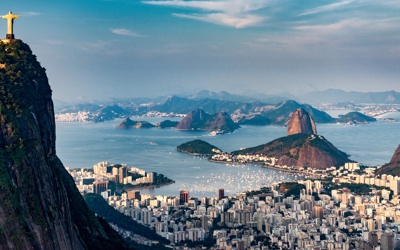
Collections
City Tour
103 Activities
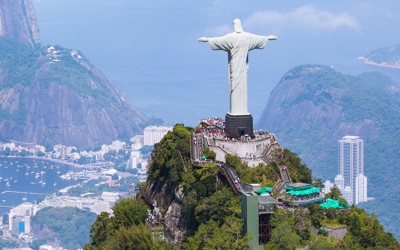
Collections
Christ Statue Corcovado
89 Activities
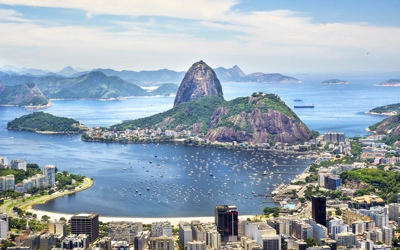
Collections
Sugarloaf Mountain
79 Activities

Collections
Carnival
32 Activities
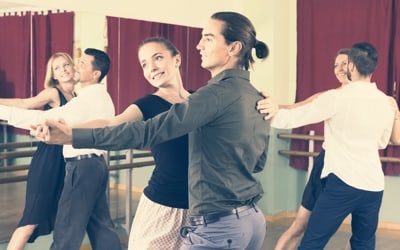
Collections
Dance Class
12 Activities

Collections
Garden & Forest
63 Activities

Collections
Jeep Tour
10 Activities
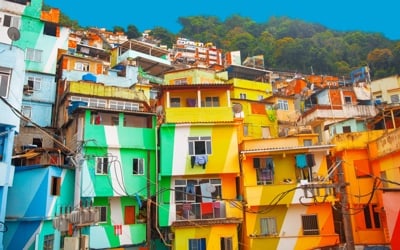
Collections
Favela Tour
23 Activities
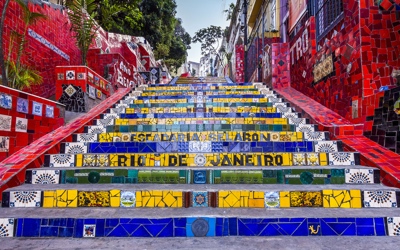
Collections
Santa Teresa
20 Activities

Collections
Boat & Cruise
37 Activities





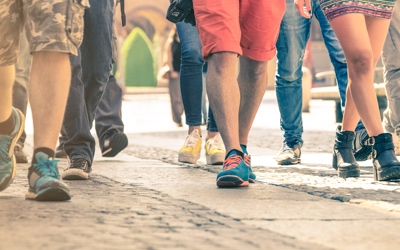

A very interesting tour for first time visitors in Rio. Many places and atractions we saw that we do not know before. Leonardo was a very good and patient guide for the three of us. We are very satisfied with this tour
Because it was afternoon and 102 degrees no one else was interested in a walking tour, so we had a private tour. Our guide Tauan was the best.....very knowledgeable, considerate, good sense of humor. We walked for 4 hours, rode the subway, and saw things we never would have found on our own, like the money exhibit in the museum in the bank building. A wonderful experience all around!